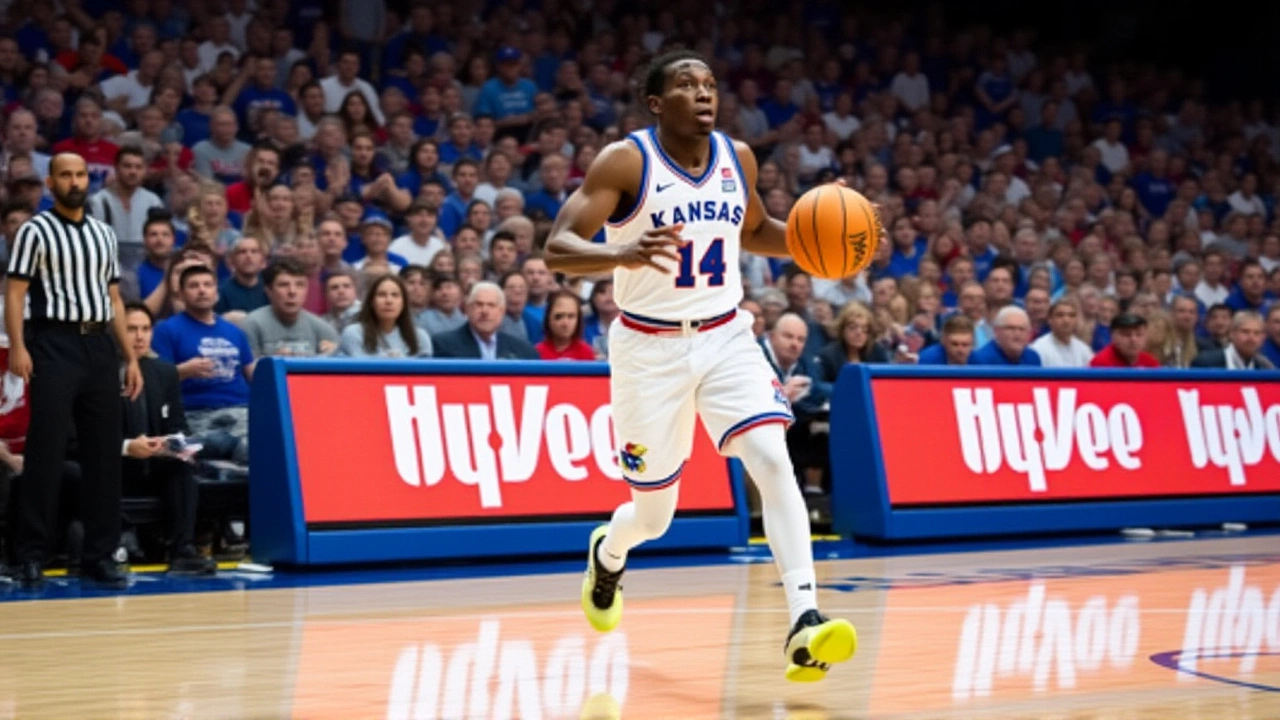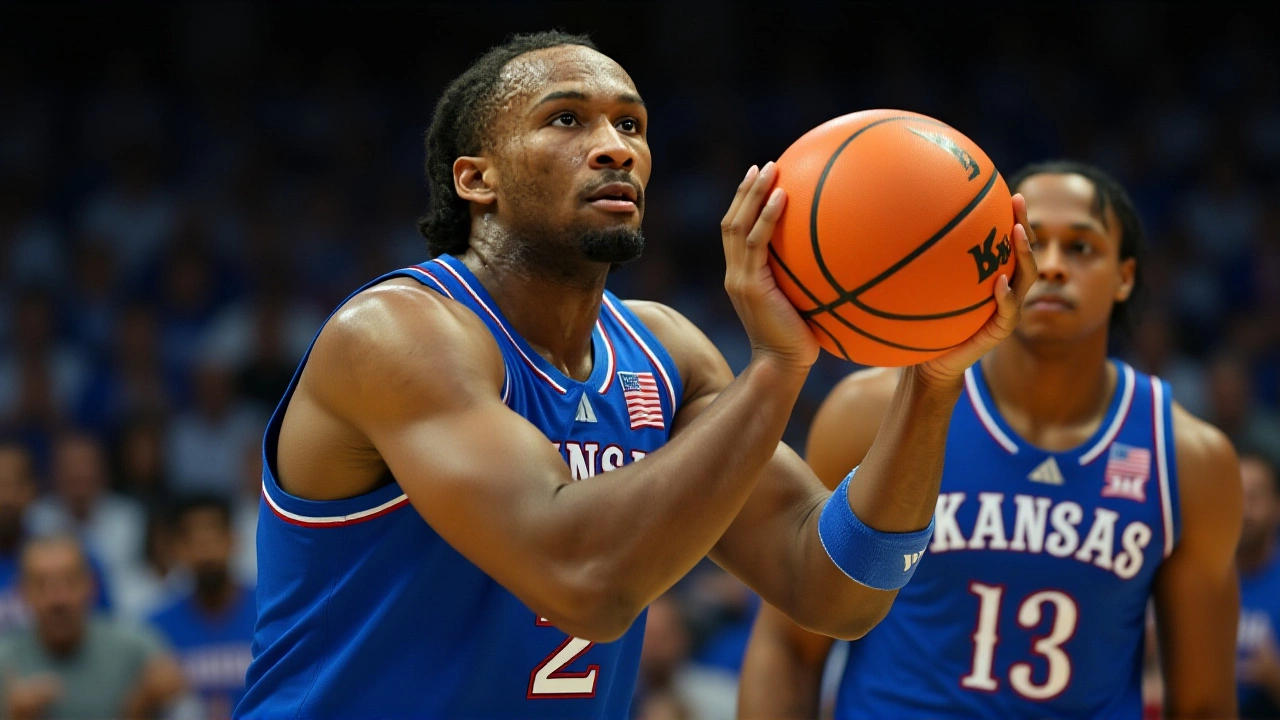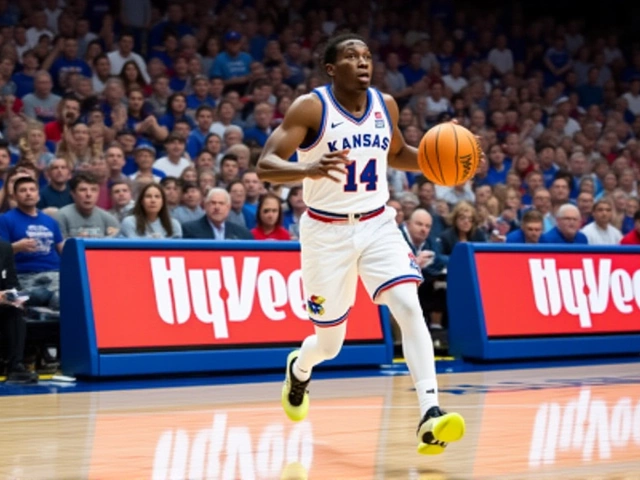
No. 5 Duke Blue Devils pulled away from No. 24 Kansas Jayhawks in a gritty 78-66 victory on Tuesday, November 18, 2025, at Madison Square Garden in New York City — a game that wasn’t decided by flash, but by grit. The win, part of the annual State Farm Champions ClassicMadison Square Garden, extended Duke’s home-court dominance at the arena to 43-18 all-time and gave head coach Jon Scheyer his fourth straight win at the Garden since taking over the program. But here’s the thing: this wasn’t a blowout. It was a battle. And Kansas, despite missing starting guard Darryn Peterson for the ‘immediate future,’ nearly stole it.
First Half Control, Then a Defensive Clutch
Duke didn’t dominate early. Kansas hung tough, trading baskets through the first 15 minutes. But then, with 8:24 left in the half, the Jayhawks went ice cold — shooting 2-of-13 over the final stretch. Duke, meanwhile, ripped off a 17-5 run, fueled by interior pressure and smart ball movement. By halftime, the Blue Devils led 41-33, and the tone had shifted. It wasn’t just offense; it was defense. Kansas entered the game averaging 80.3 points per game. They’d score just 66 here.
Cameron Boozer Leads the Way — Again
Cameron Boozer, Duke’s sophomore forward, turned in his second straight double-double: 18 points, 10 rebounds, five assists. He was everywhere — finishing at the rim, passing out of double teams, even drawing fouls. But what stood out wasn’t just his stats. It was his poise. At 19 years old, he played like a veteran who’d been through this before. And he wasn’t alone.
Enter Cayden Boozer, the freshman guard. With Duke clinging to a 64-61 lead in the second half, Cayden went on a personal 7-point run — a step-back three, a driving layup, then a clutch free throw after a foul. It wasn’t flashy, but it was decisive. "He’s learning how to play under pressure," Scheyer said afterward. "And right now, he’s answering the bell."
Kansas Fights, But Foul Trouble Dooms Them
Tre White was phenomenal for Kansas — 23 points, nine rebounds, relentless on both ends. He carried the Jayhawks when others couldn’t. But the team’s depth was exposed. All five starters picked up at least one foul in the first half. By the final minutes, Flory Bidunga was on the bench with four fouls, and Bryson Tiller fouled out with 3:04 left. That’s not bad luck — that’s poor execution under pressure.
Kansas cut the lead to 67-64 on a deep three from Melvin Council Jr. with under five minutes to go. But then came the dagger: Isaiah Evans, Duke’s guard, pulled up from 25 feet with the shot clock winding down. Swish. 72-64. The crowd gasped. Kansas never scored again.
Defense Wins Championships — And Games Like This
Duke held Kansas scoreless over the final five minutes. Zero field goals. Zero assists. Just silence. The Jayhawks finished 23-of-63 from the field (36.5%), and 4-of-18 from three. Meanwhile, Duke’s bench outscored Kansas 18-5 — a stat that tells you everything about who had more depth, more energy, more belief.
"It’s never going to be easy against Kansas," Scheyer said in his postgame presser. "They protect the ball. They make you work. But our guys stayed composed. That’s what we’ve been working on since the Tennessee exhibition — learning how to play physical without panicking."

What’s Next? A Tale of Two Schedules
Duke returns to Cameron Indoor Stadium in Durham on Friday, November 21, to host Niagara. The Blue Devils are 5-0, and their defense — allowing just 61.2 points per game — is the best in the ACC. They’ve held four opponents under 65 points. That’s not a fluke. That’s a system.
Kansas, meanwhile, heads to Las Vegas for the Players Era tournament, opening against Notre Dame on Monday, November 24. Without Peterson — who’s sidelined indefinitely — and with foul trouble exposing their lack of depth, the Jayhawks have work to do. Their offense is still elite. But their defense? It’s not good enough to win big games.
Why This Matters
This wasn’t just another early-season win. It was a statement. Duke, once seen as a team rebuilding after last year’s NCAA exit, now looks like a legitimate title contender. Their defense is elite. Their frontcourt is balanced. And Scheyer, who inherited a legacy-heavy program, is proving he can lead it without relying on one-and-done stars.
Kansas? They’re still dangerous. But they’re vulnerable. And against elite teams, vulnerability gets exposed.
Frequently Asked Questions
How did Duke’s defense manage to hold Kansas to 66 points when they average 80.3?
Duke’s defense focused on contesting every three-pointer and collapsing on drives, forcing Kansas into low-percentage mid-range shots. The Jayhawks shot just 36.5% from the field and 22.2% from three. Duke also forced 14 turnovers, turning them into 16 points. Most importantly, they held Kansas scoreless over the final five minutes — a stretch that turned a close game into a decisive win.
Why is Darryn Peterson’s absence so critical for Kansas?
Peterson, Kansas’s starting guard, averages 12.4 points and 4.1 assists per game and is their primary ball-handler in crunch time. His absence left Tre White to shoulder too much offensive responsibility, and without Peterson’s playmaking, Kansas struggled to create clean looks against Duke’s switching defense. His leadership and defensive intensity are also irreplaceable in high-pressure games.
What does Jon Scheyer’s 4-0 record at Madison Square Garden say about his coaching?
Scheyer’s perfect record at MSG — including wins over Kansas, Kentucky, and North Carolina — shows he’s not just preserving Duke’s legacy, he’s enhancing it. Winning in New York, especially against elite programs, requires mental toughness and adaptability. Scheyer has proven he can manage big-game pressure, develop young talent like the Boozer brothers, and execute game plans under the brightest lights.
How did Cameron and Cayden Boozer complement each other on the court?
Cameron, the physical sophomore, dominated inside with scoring and rebounding, drawing double teams and creating space. Cayden, the freshman guard, used that space to attack the basket and hit clutch shots. Their chemistry was evident in transition: Cameron would rebound, find Cayden on the wing, and Cayden would either drive or kick out for open threes. Together, they combined for 38 points, 19 rebounds, and 11 assists — the engine of Duke’s offense.
Is Duke now a national title favorite after this win?
They’re in the conversation. Duke’s defense is top-five nationally, they’ve got two elite forwards in the Boozer brothers, and their bench depth is improving. But they still struggle with turnovers (16 against Kansas) and haven’t faced a true elite guard yet. Their real test comes in January, when ACC play begins. But if they keep playing like this, they’re not just a contender — they’re a threat.
What does this win mean for the Champions Classic’s prestige?
This game reaffirmed the Champions Classic as college basketball’s most meaningful early-season showcase. Duke-Kansas is a rivalry with history, and playing it at Madison Square Garden — the world’s most famous arena — adds gravity. With both teams ranked in the top 25 and a dramatic finish, this game delivered on the event’s promise: elite basketball, under pressure, in front of a national audience.




